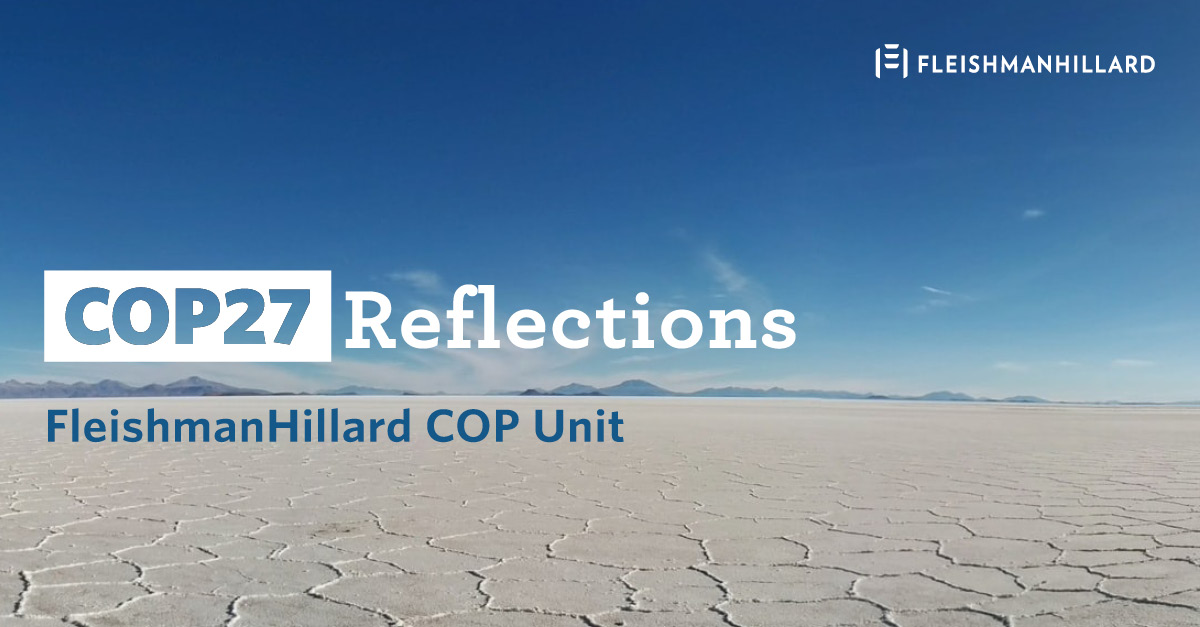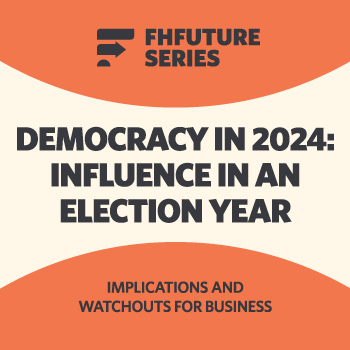COP27 Reflections: Authentic communication is critical to maintaining public belief in corporate engagement

Imogen Sackey, Associate Director, Corporate Reputation & Purpose; and Anthea Flint, Director, Consumer
Almost half of consumers either don’t know which business commitments to believe in or don’t trust companies on climate change and sustainability issues. Given 64% of the British public believe business is accountable for helping to tackle climate change, this lack of credibility is worth paying attention to.
Looking at the journey to COP27 and engagement on the ground, it is perhaps easy to see why. Corporate representation at this year’s Summit is markedly reduced from the level seen at COP26 in Glasgow last year, despite the climate ‘carnage’ experienced this year with extreme flooding worldwide and consecutive windstorms, droughts and wildfires.
Reflecting on these realities, and in spite of many of the firsts we’ve seen in Egypt – including loss and damage being addressed formally and youth activists taking centre stage – the public would be forgiven for feeling a loss of momentum at the all-critical “implementation COP”. After all, that all-important corporate engagement feels missing.
Given the sheer volume of business commitments set last year, questions of progress and accountability one year on are perhaps inevitable. While travelling to Egypt may well not be required for businesses to deliver on their promises, it is important to ensure plans are being implemented.
So what is the role of communications in maintaining corporate engagement on climate action?
- Maintaining public focus: Even after greater interest in COP26 than ever before, climate news dropped 77% in Q1 2022 compared to Q4 2021 and it hasn’t recovered since; which reveals a critical opportunity for business to drive the climate agenda and maintain public focus. Central to achieving progress; is engaging different stakeholders on the journey along the way. More open and consistent communications from businesses on climate ensures visibility of progress and new solutions available.
- Connecting head and heart: A constant challenge facing progress is how to make change feel possible when the ask ahead is so great and for many, so overwhelming. Though now seven years old, Dame Ellen MacArthur’s 2015 TED Talk, in which she reflects on the pace of change in the lifetime of just one man, her grandfather, is a brilliant example of the power of communications. By connecting head and heart, it instils belief that change in the short-term is achievable. Instilling this sense of belief and making the intangible real can be the difference between maintaining momentum and public disengagement.
- Bridging the authenticity gap: No one business will alone solve climate change and unless a business was born as a sustainable solution, chances are they won’t get everything right. That shouldn’t freeze corporations into inaction because businesses can all do something. They must do something. But for companies looking to make often hard choices about where they can carry greatest impact; understanding authenticity has become critical.
- At Fleishman, we often talk about using communications tackling the ‘authenticity gap’ that exists between brand; what a company says and how it behaves, and reputation; what others say about it. An increased focus on transparent communications about what they can do and humble communications about how they are trying to do more can help to bride this gap.
- Empowering better choice: Mainstream climate news is currently quite bleak, with negative reactions to eco-activism, climate change-induced extreme weather disasters, and reports that net zero pledges are unlikely to be met. It is hard to feel hopeful reading the daily COP27 digests. If communication is key to making change feel possible, it has never been more essential for businesses to explain, as often as is necessary, that informed and responsible everyday choices can make a difference. Businesses must never cease to assure consumers that change is within their grasp and sustainable innovations in business models will empower them to reduce their footprint in small ways every day.
Put simply, communication can and should be a tool by which businesses can credibly reassure stakeholders – whether consumers, partners or political stakeholders – that meaningful change is not only possible; but it is happening. Today, tomorrow, and every day.
Find Out More
-
Democracy in 2024: Influence in an election year
May 2, 2024
-
Platinum CMS Award
March 13, 2024
-
Changing Communications Tack at Mobile World Congress
February 21, 2024


